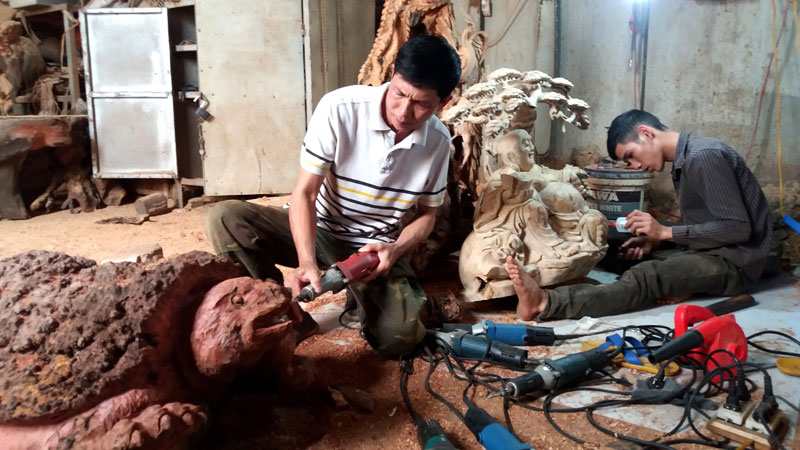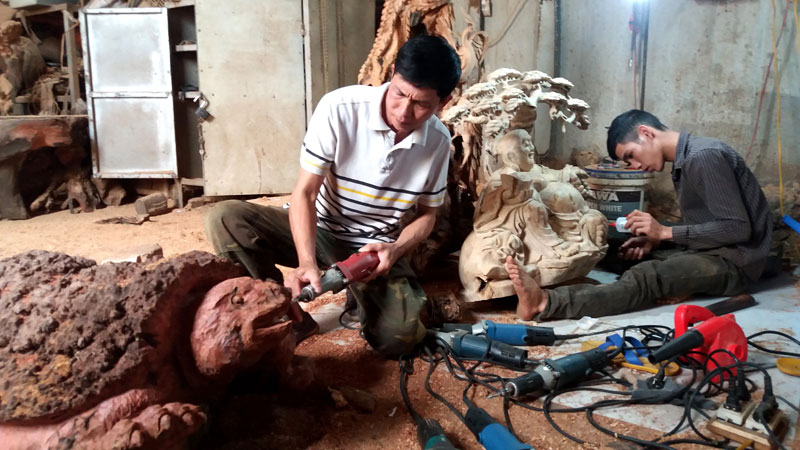
(HBO) – The driftwood production firm of Mr. Doan Xuan Thanh is located in Doan Ket Village, Lam Son Commune, Luong Son District.

Mr. Doan Xuan Thanh made turtle products from
the wood grind.
Currently, Mr. Thanh is the leader of Lam Son
craft village of driftwood, stone scene. Mr. Thanh said: Driftwood career
requires passion and virtue in the artist, which can make other different products
with high value. I am both the "boss" and a worker. I can not be
hands- free but have to put the passion in the products and make the products
lively. The products of the firm are very diverse, rich, and colorful. Mr.
Thanh introduced some typical wooden driftwood products such as: Cuu Long Tranh
Chau is made of milling horn wood, which is heat resistant, no warping, and
durable.The products of nine wooden dragons was ground finely with precious
ruby valued at 150 million VND. For finishing, three sculptors had to work
diligently for up to 3 months.The talented three-legged toad weighs about 7
quintals was made of ground hardwood roots, which will has no termites by time,
will make fortune and money for homeowners, etc. Each product shows its art characteristics.
The Statue of Fortune Goddess expresses
joyfulness, brightness, warmth.Ong Tho Statue was made from Lu wood with the
part of wealth and health. The furniture looked as regal crafted from mahogany
incense wood, for the villas and garden houses.
Each finished product carries much sweat,
effort, passion. Now, the job is occupied into the soul, the heart which makes
sorry feeling to sell the products. A few years ago, he brought the products of
five-happiness- Cedrus tree with 3
meters high made of Gu Huong driftwood to attend the fair in Hoa Binh, many
people loved and wished to see. Finally, the five-happiness- Cedrus tree was
was bought by a Thai Nguyen entrepreneur.
Lam Son wood products have been confident to
continuously participate in the fairs in the northern provinces such as Hai
Duong, Hai Phong, Nam Dinh, Ha Nam and some provinces in the South, are being
looked for by buyers. He intends to invest in depth, expanding and improving
the quality of products made from driftwood with billion higher value,
contributing to building Lam Son craft village of driftwood, stone scene.
According to data from the Hoa Binh Provincial Party Committee, the industrial production index for the first six months of 2025 is estimated to have increased by 20% compared to the same period last year. This marks the highest year-on-year growth rate for this period since 2020.
In the first six months of 2025, Hoa Binh province’s export turnover was estimated at 1.145 billion USD, marking an 18.11% increase compared to the same period in 2024. Import turnover was estimated at $ 804 million, a 17.15% increase, which helped the province maintain a positive trade balance.
The lives of the ethnic minority farmers in Tan Lac district have gradually improved thanks to the new directions in agricultural production. This is a testament to the collective strength fostered through the professional associations and groups implemented by various levels of the district’s Farmers’ Union.
With the motto the "product quality comes first,” after nearly one year of establishment and operation, Muong village’s Clean Food Agricultural and Commercial Cooperative, located in Cau Hamlet, Hung Son Commune (Kim Boi district), has launched reputable, high-quality agricultural products to the market that are well-received by consumers. The products such as Muong village’s pork sausage, salt-cured chicken, and salt-cured pork hocks have gradually carved out a place in the market and they are on the path to obtaining the OCOP certification.
In the past, the phrase "bumper harvest, rock-bottom prices" was a familiar refrain for Vietnamese farmers engaged in fragmented, small-scale agriculture. But today, a new spirit is emerging across rural areas of Hoa Binh province - one of collaboration, organisation, and collective economic models that provide a stable foundation for production.
Maintaining growing area codes and packing facility codes in accordance with regulations is a mandatory requirement for agricultural products to be eligible for export. Recently, the Department of Agriculture and Environment of Hoa Binh province has intensified technical supervision of designated farming areas and packing facilities to safeguard the "green passport" that enables its products to access international markets.



